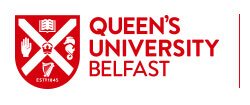Aglaia De Angeli
Lecturer in Modern History
09/06/2020
You may have wondered how historians can research and write about the past, explain it to a wide public, spread the knowledge to academia or to the general public, and thought I want to do that. But, where should I start? If you think that one day you will become an historian, I can tell you five good reasons how you can realize your aspiration at Queen’s University Belfast.
First: at Queen’s we teach from undergraduate to doctoral level the whole way through to becoming an historian. We teach you how to read, research, write, and publish about American, Asian, African, European, Irish and British history, from antiquity to the present, through the lenses of social, gender, race, urban, religious and political points of view. And, you can do it with the support of our dedicated staff at HAPP.
Second: we have two MA options for students interested in history: MA in History and MA in Public History. The MA in History will teach to build your own expertise across a range of modules that offer important methodological, theoretical and source-based training opportunities. You can develop your specialism in the area of your interest or try a thematic approach, or combine both with an interdisciplinary approach. We will teach you how to become an independent researcher and prepare for your PhD.
The MA in Public History offers you the opportunity to participate in class seminars, field trips, practitioner workshops, and it teaches you the ways in which history is represented to a range of public audiences. It also provides you with a guaranteed work placement. You will be trained in historical theory and research methods to work in museums, specialising in oral and digital history, contested or difficult histories and visual representations of the past.
Third: we have a Centre for Public History that provides a lively hub for people engaged in researching, teaching, and practicing public history. It nurtures excellent research, provides a forum for debate, and develops working dialogue between academics, practitioners, and the public around issues relating to the practice of history in the public sphere. The Centre hosts monthly seminars with invited speakers both global and local in scope, such as the new Histories in the Making series, the Keith Jeffery Annual Public History Lecture, and the Wiles Lectures.
Four: at The McClay Library we are proud to host a treasure in rare, early printed books and manuscripts of unpublished collections. Special Collections & Archives includes the printed collections of important figures such as the Scottish economist Adam Smith, John Foster, the last Speaker of the Irish House of Commons; books and pamphlets collected by Dr. Stanley Fowler Wright, Commissioner of Customs and Personal Secretary to the Inspector General of the Chinese Maritime Customs, Sir Robert Hart and the extensive historical medical collection of Dr Samuel Simms to name but a few, three maps collections relating to Ireland dating back to the mid-16th century and more than fifty individual collections of manuscripts including the personal papers of Edith Somerville; correspondence of the English Composer and Feminist, Dame Ethel Smyth; the personal papers and correspondence of Sir Robert Hart, Inspector General of the Imperial Customs, Peking, 1863-1908 as well as papers relating to communism in Ireland, and the history of science in the Thomas Andrews and James Thomson collections.
Fifth: at HAPP, in collaboration with the Centre for Public History and Special Collections, we work on many engaging international research projects, in particular the Sir Robert Hart project. Hart, a graduate of Queen’s and later Inspector General of the Chinese Imperial Maritime Customs from 1863 to 1908, was the most senior Westerner in China’s metropolitan bureaucracy in the later nineteenth century. During his tenure Hart built the Chinese Imperial Maritime Customs (CIMC) into the first Western-style administrative institution in China, helped to establish the postal service, lighthouses and other key elements of China’s infrastructure. He played a crucial role in China’s imperial politics, significantly influencing its internal reform and diplomatic policy.
The Sir Robert Hart Project includes the transcription of Hart’s diaries in 77 volumes and other elements of the Hart collection. The Hart Project has established collaborations with the Institute of Modern History in the Chinese Academy of Social Sciences, Beijing and with the China Customs Museum, Beijing.
I gave you five good reasons why you should come to QUB to study, research and explore history with us at undergraduate, Masters or PhD level. Do you want to know more? Contact us!
